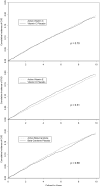A randomized factorial trial of vitamins C and E and beta carotene in the secondary prevention of cardiovascular events in women: results from the Women's Antioxidant Cardiovascular Study
- PMID: 17698683
- PMCID: PMC2034519
- DOI: 10.1001/archinte.167.15.1610
A randomized factorial trial of vitamins C and E and beta carotene in the secondary prevention of cardiovascular events in women: results from the Women's Antioxidant Cardiovascular Study
Abstract
Background: Randomized trials have largely failed to support an effect of antioxidant vitamins on the risk of cardiovascular disease (CVD). Few trials have examined interactions among antioxidants, and, to our knowledge, no previous trial has examined the individual effect of ascorbic acid (vitamin C) on CVD.
Methods: The Women's Antioxidant Cardiovascular Study tested the effects of ascorbic acid (500 mg/d), vitamin E (600 IU every other day), and beta carotene (50 mg every other day) on the combined outcome of myocardial infarction, stroke, coronary revascularization, or CVD death among 8171 female health professionals at increased risk in a 2 x 2 x 2 factorial design. Participants were 40 years or older with a history of CVD or 3 or more CVD risk factors and were followed up for a mean duration of 9.4 years, from 1995-1996 to 2005.
Results: A total of 1450 women experienced 1 or more CVD outcomes. There was no overall effect of ascorbic acid (relative risk [RR], 1.02; 95% CI, 0.92-1.13 [P = .71]), vitamin E (RR, 0.94; 95% CI, 0.85-1.04 [P = .23]), or beta carotene (RR, 1.02; 95% CI, 0.92-1.13 [P = .71]) on the primary combined end point or on the individual secondary outcomes of myocardial infarction, stroke, coronary revascularization, or CVD death. A marginally significant reduction in the primary outcome with active vitamin E was observed among the prespecified subgroup of women with prior CVD (RR, 0.89; 95% CI, 0.79-1.00 [P = .04]; P value for interaction, .07). There were no significant interactions between agents for the primary end point, but those randomized to both active ascorbic acid and vitamin E experienced fewer strokes (P value for interaction, .03).
Conclusion: There were no overall effects of ascorbic acid, vitamin E, or beta carotene on cardiovascular events among women at high risk for CVD.
Trial registration: ClinicalTrials.gov NCT00000541.
Figures



Comment in
-
Clinical trials of antioxidant supplementation in the prevention of cardiovascular events.Arch Intern Med. 2008 Apr 14;168(7):773; author reply 773-4. doi: 10.1001/archinte.168.7.773-a. Arch Intern Med. 2008. PMID: 18413563 No abstract available.
Similar articles
-
Effects of vitamins C and E and beta-carotene on the risk of type 2 diabetes in women at high risk of cardiovascular disease: a randomized controlled trial.Am J Clin Nutr. 2009 Aug;90(2):429-37. doi: 10.3945/ajcn.2009.27491. Epub 2009 Jun 2. Am J Clin Nutr. 2009. PMID: 19491386 Free PMC article. Clinical Trial.
-
Vitamin E, vitamin C, beta carotene, and cognitive function among women with or at risk of cardiovascular disease: The Women's Antioxidant and Cardiovascular Study.Circulation. 2009 Jun 2;119(21):2772-80. doi: 10.1161/CIRCULATIONAHA.108.816900. Epub 2009 May 18. Circulation. 2009. PMID: 19451353 Free PMC article. Clinical Trial.
-
A secondary prevention trial of antioxidant vitamins and cardiovascular disease in women. Rationale, design, and methods. The WACS Research Group.Ann Epidemiol. 1995 Jul;5(4):261-9. doi: 10.1016/1047-2797(94)00091-7. Ann Epidemiol. 1995. PMID: 8520707 Clinical Trial.
-
Design of Physicians' Health Study II--a randomized trial of beta-carotene, vitamins E and C, and multivitamins, in prevention of cancer, cardiovascular disease, and eye disease, and review of results of completed trials.Ann Epidemiol. 2000 Feb;10(2):125-34. doi: 10.1016/s1047-2797(99)00042-3. Ann Epidemiol. 2000. PMID: 10691066 Review.
-
Antioxidant vitamins and coronary artery disease risk.Am J Med. 1994 Sep 26;97(3A):18S-21S; discussion 22S-28S. doi: 10.1016/0002-9343(94)90294-1. Am J Med. 1994. PMID: 8085582 Review.
Cited by
-
Effects of the Consumption of Low-Fat Cooked Ham with Reduced Salt Enriched with Antioxidants on the Improvement of Cardiovascular Health: A Randomized Clinical Trial.Nutrients. 2021 Apr 27;13(5):1480. doi: 10.3390/nu13051480. Nutrients. 2021. PMID: 33925704 Free PMC article. Clinical Trial.
-
Haptoglobin genotype and its role in diabetic cardiovascular disease.J Cardiovasc Transl Res. 2012 Aug;5(4):423-35. doi: 10.1007/s12265-012-9361-z. Epub 2012 Mar 24. J Cardiovasc Transl Res. 2012. PMID: 22447230 Free PMC article. Review.
-
Regulation of thrombosis and vascular function by protein methionine oxidation.Blood. 2015 Jun 18;125(25):3851-9. doi: 10.1182/blood-2015-01-544676. Epub 2015 Apr 21. Blood. 2015. PMID: 25900980 Free PMC article. Review.
-
Scientific opinion on the tolerable upper intake level for vitamin E.EFSA J. 2024 Aug 2;22(8):e8953. doi: 10.2903/j.efsa.2024.8953. eCollection 2024 Aug. EFSA J. 2024. PMID: 39099617 Free PMC article.
-
Association of plasma vitamin C concentration to total and cause-specific mortality: a 16-year prospective study in China.J Epidemiol Community Health. 2018 Dec;72(12):1076-1082. doi: 10.1136/jech-2018-210809. Epub 2018 Aug 12. J Epidemiol Community Health. 2018. PMID: 30100578 Free PMC article.
References
-
- Steinberg D, Parthasarathy S, Carew TE, Khoo JC, Witztum JL. Beyond cholesterol: modifications of low-density lipoprotein that increase its atherogenicity. N Engl J Med. 1989;320:915–924. - PubMed
-
- Diaz MN, Frei B, Vita JA, Keaney JFJ. Antioxidants and atherosclerotic heart disease. N Engl J Med. 1997;337:408–416. - PubMed
-
- Halliwell B. Free radicals, antioxidants, and human disease: curiosity, cause, or consequence. Lancet. 1994;344:721–724. - PubMed
-
- Dauchet L, Amouyel P, Hercberg S, Dallongeville J. Fruit and vegetable consumption and risk of coronary heart disease: a meta-analysis of cohort studies. J Nutr. 2006;136:2588–2593. - PubMed
-
- Stampfer MJ, Hennekens CH, Manson JE, et al. Vitamin E consumption and the risk of coronary disease in women. N Engl J Med. 1993;328:1444–1449. - PubMed
Publication types
MeSH terms
Substances
Associated data
Grants and funding
LinkOut - more resources
Full Text Sources
Medical

